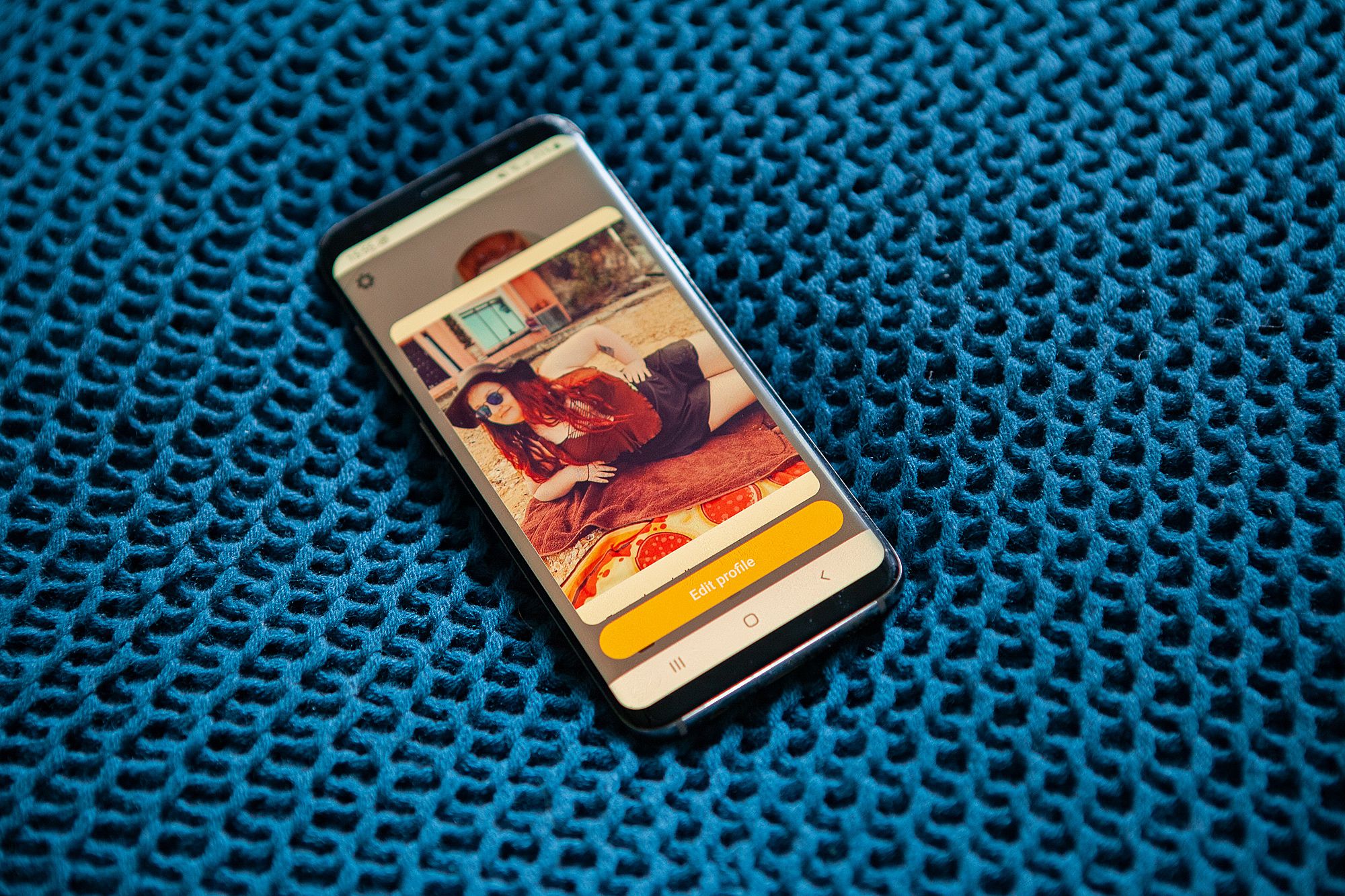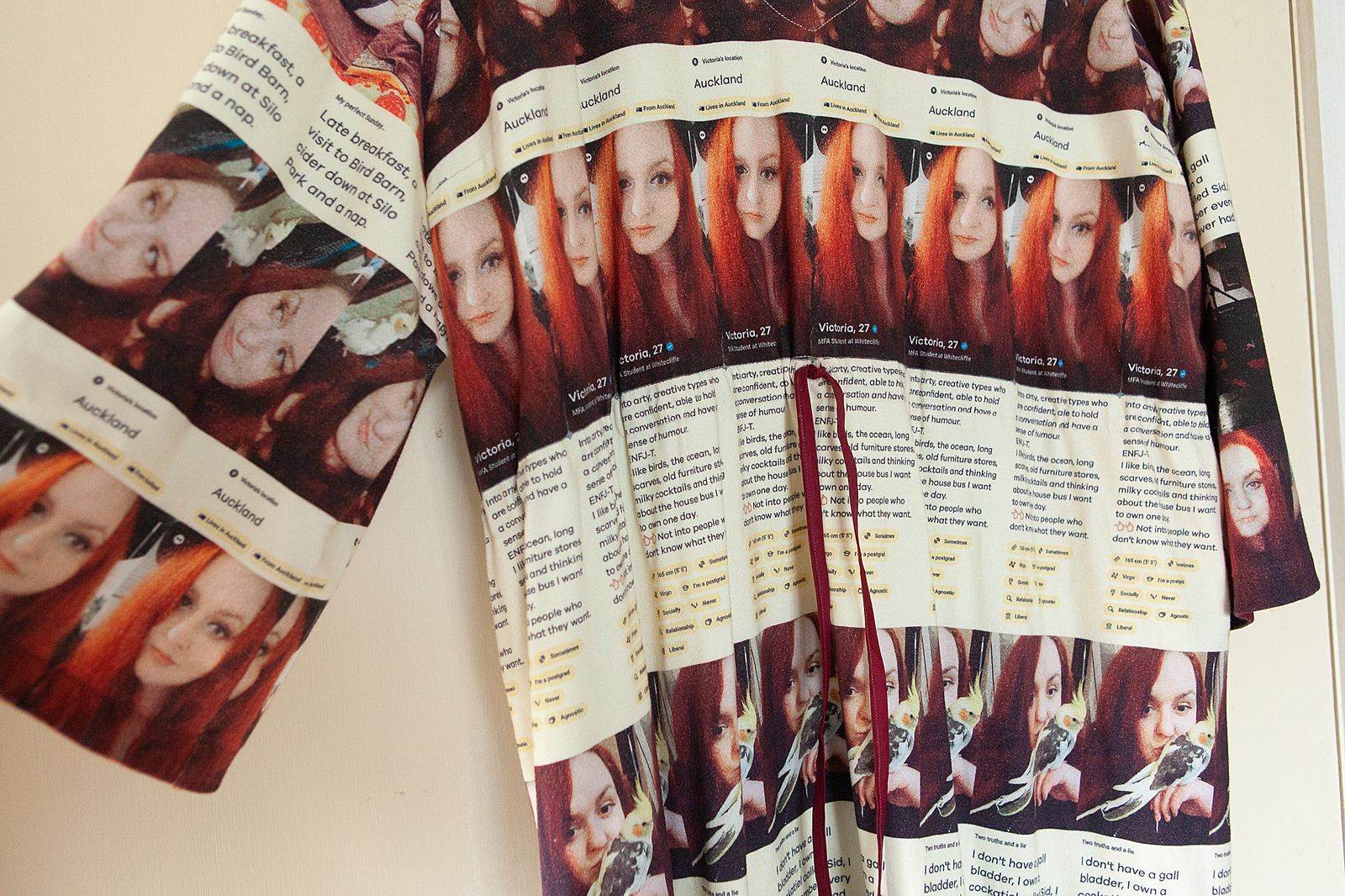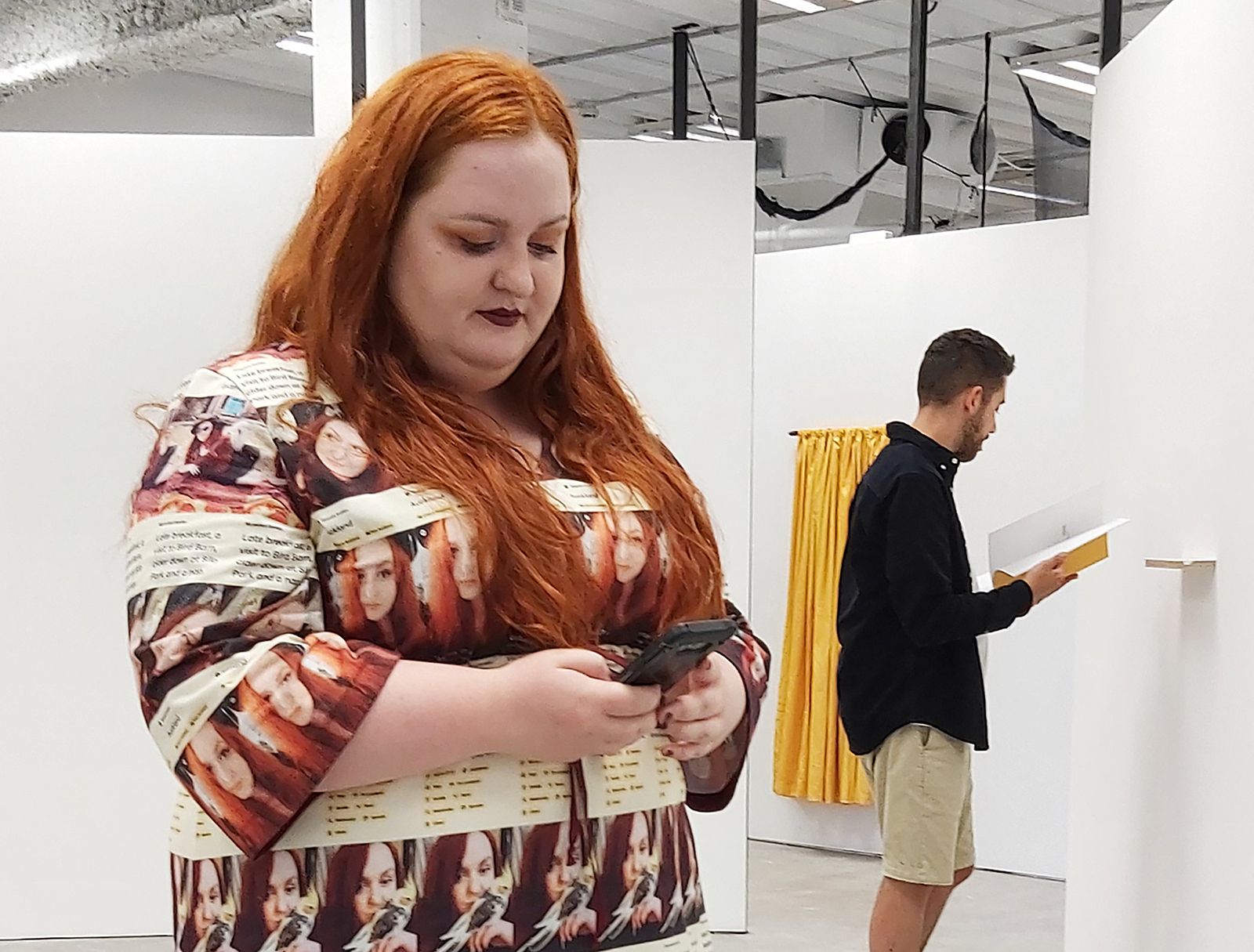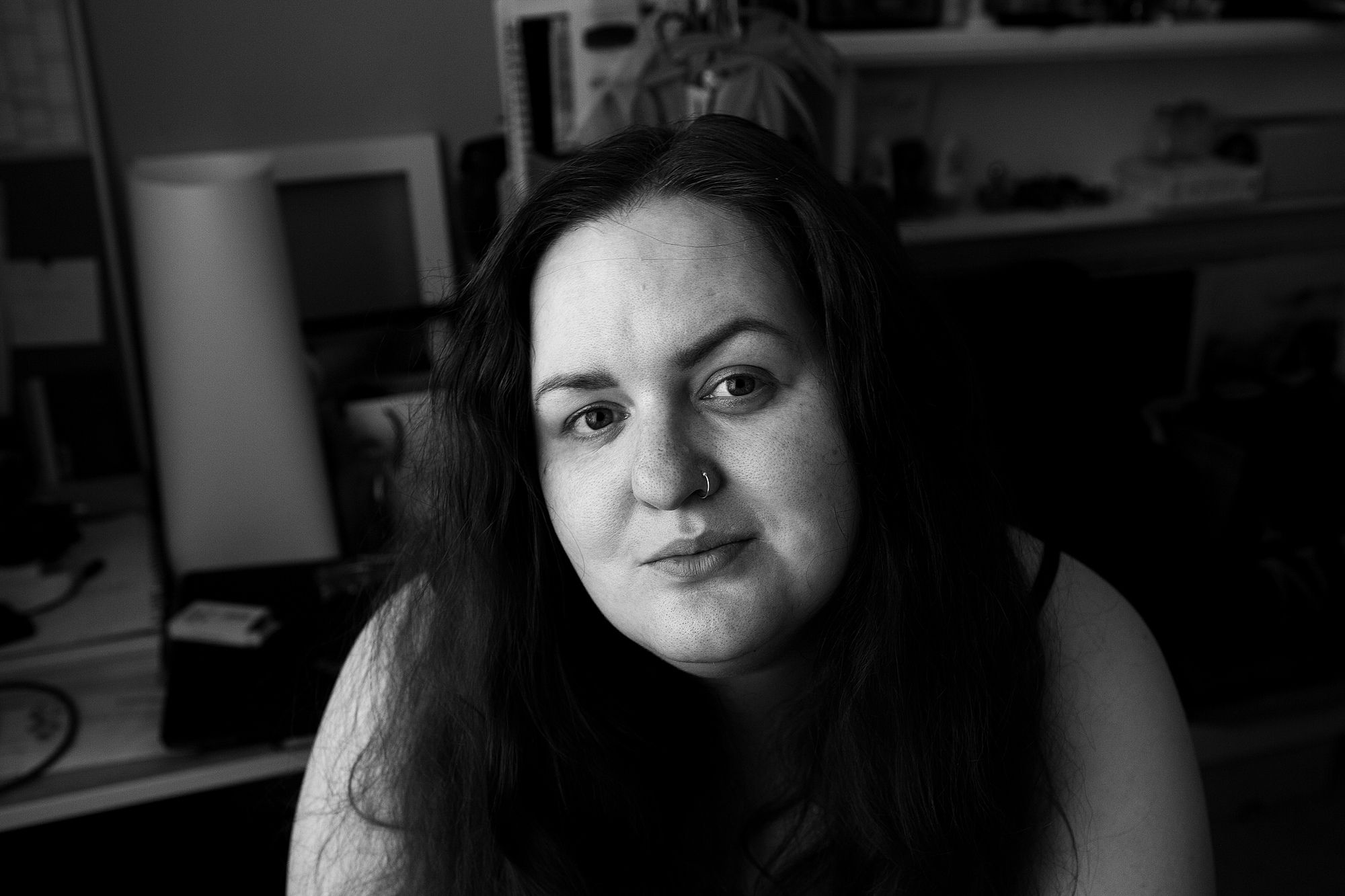Dating Fat
Victoria Hollings tells us her story of using dating apps as a fat woman.
'Who We Are Now' is a new series of first-person essays on life in Aotearoa in the present moment, supported by a Copyright Licensing New Zealand Contestable Fund Grant 2020.
The names of people discussed in this article have been changed.
When I first signed up to Tinder in 2014, I was kind of embarrassed. The app had only come out a couple of years before and was still pretty new. There seemed to be a widely held assumption that it was something only desperate, sex-crazed people would use. It was important to me not to appear that way. I can’t be fat and desperate.
I signed up to Tinder under the guise of being “a traveller wanting to meet people” while I was in the UK. The only thing I remember from this short stint was someone asking me to come to their hotel room without having met me or even spoken to me for more than a few minutes. He assured me I would “not be disappointed”.
I promptly deleted Tinder on my return to New Zealand, in case anyone I knew saw me on there and wondered why I couldn’t get a date the old-fashioned way. It made me think of the time when I was 14 and I got my first boyfriend. A kid at high school said I was “punching above my weight”. He didn’t have a girlfriend or anything, but I took it on board regardless.
I don’t think I was actually ever really overweight (whatever that means) when I was growing up, but I always thought I was and that feels about the same. I am now, though, by any medical or societal definition. It’s kind of a self-fulfilling prophecy too – the more you restrict your food intake and torture your body, the tighter it holds on to what you feed it.
Body size is often the first port of call for teasing and controlling women. Experiences at a young age that depreciate your internal value exacerbate a need to be desired by others, at the cost of yourself. It starts so young that the thoughts you have of feeling like you have no value begin to feel like your own natural thoughts, instead of thoughts implanted in your head by diet culture and the social pressure for women to be thin. Being thin matters more than anything else, especially when thinness becomes dating currency.
In the dating world, it seems as if a straight man’s greatest fear is meeting up with a date, only to find she is fat.
I felt a great sense of injustice: not just for my fat, white body, but all bodies that didn’t make the grade of the thin, white ideal. The bodies that have different abilities, that aren’t white or that suffer at the hands of the thinly veiled class system in New Zealand. I’ve had surgery and therapy to attempt to correct the damage that weight cycling has done to my body and mind.
Body size is often the first port of call for teasing and controlling women.
When you’re fat, it’s hard to tell why certain things are happening – whether they’re a symptom of dating, or a symptom of societal fatphobia, or a bit of both. As with any divergence from the norm, it’s sometimes hard to attribute negative experiences to intersections of oppression. I wonder if people comment on my body more because I’m fat, or if it’s just because women are constantly observed and criticised anyway. Is it because I’m not playing my part as the woman who obediently shrinks her body, and therefore must be shamed into submission? I face another Christmas lunch and my grandmother says for the millionth time that I’ve put on weight. The tone is judgement and worry measured equally enough to stifle any form of retort. Aggression wrapped neatly in concern. How can people get over their need to ‘concern bully’ people over their weight, if they can’t see that it’s oppressive to comment on other people’s bodies?
When I Google ‘Intersectional Feminism’, several articles mention that intersectionality is the crossroads of race, ability, sexuality, class and “etc.”. Body size may fall into this “etc.” category, but to place it there further trivialises the experience. If fat phobia is an afterthought by definition, as it appears to be, then it opens up the debate about whether fatness deserves a place at the table at all. Intersectionality is the act of centring these oppressed voices, whichever axes of marginalisation they cross. Being a fat woman, being a fat black woman, being a fat trans woman – these are all unique and differently difficult experiences. Fat oppression must be part of all intersecting definitions, as it is in real life. After all, fatphobia finds its roots in anti-blackness and classist rhetoric.
Let me be clear, I'm a cis-gendered, heterosexual, white-passing woman. I benefit daily from the enduring privilege this affords me. These doors are open and welcoming to me, these doors of privilege I easily cross the thresholds of. In examining fatphobia, it can be difficult to accept that privilege. That's one of the difficult things about experiencing some forms of oppression – it can make the privilege you experience in other ways hard to identify.
Intersections of feminism create layered difficulties for people who fall under different isms. Ashlea Gillon’s (Ngāti Awa) paper Fat Indigenous Bodies and Body Sovereignty: An Exploration of Re-presentations approaches fat experiences from a Kaupapa Māori and Mana Wāhine perspective, where, “fat women are routinely positioned as less than women, less than human and not having essence as they are unable to access their ‘true’ selves.” On top of this, multi-faceted, multi-level discrimination is endured via "a stratification of access, worthiness and (un)(re)liability within fatness and fatism, and this stratification is both gendered and ethnically/racially governed. Fatism is embedded within neoliberal colonisation." Racism crosses lines with fatphobia, where fat women of colour are refused access to basic human needs. Fatphobia crosses into classism, where food becomes the enemy, the fat-maker and the result of low income. Low income that is caused by lack of opportunity to pursue education and employment – caused by race-based selection processes and parental educational backgrounds. It wraps back onto itself many times over. Even though I don't identify with all of the oppressions that Ashlea Gillon discusses, it's hard to ignore that fatphobia is embedded in oppression.
My first relationship that manifested from a Tinder date was Luke. The first time we met, he came to my house and we watched Superbad. We sat as far away from each other as possible, and when the movie was over, he ran out of my house so fast I thought I’d never see him again. The first time he told me he loved me was via text. I was furious he took that moment from me. The first time he told me he loved me in person was in a hotel room in Rotorua, through the bathroom door, while I was on the toilet.
People can’t see themselves dating fat people because they don’t see anyone doing it.
We walked along Takapuna beach holding hands once and these drunk guys started yelling at us. I was scared they were going to ask why he was with me. Instead, I think they yelled something about me being a goth with a brown boy and I was relieved.
Fast-forward six months and he’s maintaining an online relationship with an ex-girlfriend, without my knowledge. She looks like me – same body type, same hair. He’d always said he liked women in larger bodies. I didn’t know what the limit of that was – genuine attraction or a fetish. Since they’d ‘broken up’ she’d had a gastric bypass procedure and lost a lot of weight.
Shortly after this relationship ended, I was back on the dating app bandwagon. This time, I had Tinder and Bumble. I’d given up on feeling awkward about being on there. By now, everyone I knew was on a dating app of some sort and it had lost its social-outcast status.
It was at this point I decided I was going to be as ‘me’ as I could be – body and all. I added full-body photos of myself at the beach on my profile. I made sure there was at least some record of a double chin or a squidgy arm. It was really important to me to reduce the anxiety of that first meeting. It’s so easy to be fatphobic to yourself when it’s the water we swim in, and you’re a fat woman with a profile consisting only of face photos from high angles. Editing myself to look smaller feels just as bad as when men openly state that they don’t date fat people. Making yourself appear thinner and more acceptable online is an aggressive act against the self that builds self loathing. No more, I said. That’s when I met Cameron.
We met at a cafe in Grey Lynn on a Tuesday afternoon. We had some extremely forced conversation over two flat whites and then decided to prolong the agony by taking a walk in Grey Lynn Park. We sat down on the grass and he asked me if I thought he was attractive. I laughed and said, “Yes”, because it felt like the right thing to do. I asked him the same, odd, question about me and he replied that he’d “never slept with anyone like [me] before”, gesturing loosely at my body. I think I laughed for two or three minutes straight in pure disbelief. It should have ended there, but it didn’t. As we were walking back to his car to say goodbye, he got a ‘phone call’ from someone saying his car was ‘being towed’, and he ran very quickly up the road and out of sight. He messaged me later saying that I “had a kind soul”. I didn’t reply.
It is radical to accept your own body as it is.
Fat people aren’t desired on TV. They’re ‘before’ photos, they’re contestants on weight-loss shows and they’re someone’s mother or aunt, the friend, comic relief, but not someone’s lover, girlfriend or the leading lady. I remember watching My Mad, Fat Diary and being floored by their portrayal of a fat young woman as desirable to an attractive male character. I think the character was as shocked as I was. Not because I don’t think it happens in real life, but because we just don’t see it portrayed in the media. People can’t see themselves dating fat people because they don’t see anyone doing it. Don’t even try to get at me with the ‘seeing the fat and loving her anyway’ storylines. Please.
Cue my next date, Simon. We messaged for a while before meeting; my preferred way of weeding out clingers, sex pests and criminals. I arrived at Citizen Park half an hour early so I could have a cider before he arrived. Dutch courage.
We hit it off instantly. I asked him if he thought I looked like my pictures. He said I’d represented myself accurately and I felt good about that. I was what he was expecting. We got exceptionally drunk, he met my friends, we danced and kissed and slept next to each other. Everything seemed like it was going to work out.
Three days later, he texted me:
Hey, I think you’re really cool and I feel like we get along really well. I do want to spend time with you but I’m not sure about doing it in a romantic context. I’m really sorry to disappoint you, I just don’t have the time or energy right now to give you the time and attention you deserve. I do genuinely like you and think you’re an amazing human, just the timing isn’t right with work and the other stuff in my life that has to take priority.
After the three-day silence, I can’t say I was totally surprised – more confused. Everyone experiences rejection, of course, but this one blindsided me and I had to figure it out. In an act of reclamation, I decided to print this shitty text directly onto a t-shirt as a way of regaining some form of agency. I wore it to bars and I found some liberation in wearing the pain of rejection on my body. It gave me a sense of ownership I hadn’t experienced before. Hiding in my room wouldn’t do this time. Wine and a few tears wouldn’t do this time.
In the midst of an MFA programme, my art practice became concerned with bodies: love bodies, fat bodies, dating bodies. My body. I allowed myself, for the first time, to want something more than being desired.
I made more t-shirts. The dating-app world recycles so quickly and the momentum was exciting. I made a list for each category – of all the people I’d dated in 2019, of which app I’d found them on, and of why I was no longer seeing them, in one or two words – and printed each one on a different t-shirt. I thought about calling this project Fat Slut.
I took one of my dates to a show where a sound artist dangled egg vibrators over herself, and naked women flailed around aggressively in fake blood on the floor. I loved this. No better way to test the potential of a man than to have him face a fiercely feminist sound-art performance – but this first date was not a sign of exciting things to come. It fizzled out quickly, with no sign of a spark. Another date ended with me threatening to call the police to get him out of my house.
Bumble Dress close up, Victoria Hollings
Bumble Dress
The bad dates and rude messages I received became poems and texts, and formed scores to sound installations. I took screenshots of my Bumble profile, had it printed onto fabric and made into a full-length dress. I wore it to the supermarket, as well as in the gallery space for a performance of my romantic availability. The dress was an attempt at a radical acceptance of the body I inhabit. The body that loves and dates and swipes left and right. To see my Bumble dress on my body is to view me as a romantic and sexual being; a way of being that is often reserved only for the thin and conventionally attractive.
I’ve been called unethical for the work I make. A great “breach of trust” of the man who tells me in no uncertain terms that my “rejection of [his] advances doesn’t fool [him]”, and that he’d like to introduce me to his “14-inch beast”. I’ve been blocked and unmatched for using messages anonymously in my work, citing it as a “cowardly, capitalist move”. I just don’t buy that. I think people should be held accountable for the things they say to strangers, and if you wouldn’t say it to your mother, perhaps keep that shit to yourself. On entering the digital dating sphere, the person on the other end often becomes not a person but a mechanical receptacle of fragile masculinity. Using the content generated by people’s cruelty does provide some relief, some agency.
Radical body acceptance changed me. It changed the way I date. I don’t stay in places I don’t want to be. I don’t date people who reduce me to my size, I don’t suffer through horrible dates to appear more likeable. It is radical to accept your own body as it is. It is radical to actively turn away from what is easy and accepted and tell to everyone that a fat body is a good body too – and not because it is striving to be smaller or has perfect blood-pressure.
I haven’t been on a date in a long time. I’m not even sure I can blame that one on self-isolation. For now, I’ll just have to settle for the sweet nothings messaged to me at 2am by Jim, who is “down to earth” and “doesn’t like drama”.



